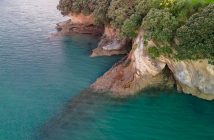The 7.8 magnitude earthquake in Kaikoura provided another sharp reminder of my call earlier this year to improve water network resilience in the light of the Christchurch quakes.
It’s early days yet but there has clearly been substantial damage done to the 3 Waters infrastructure. The sewage system is not working and residents are now using 900 chemical toilets.
The main town water supply tank is broken and one assumes there will be significant damage to pipeline assets. It will be well beyond the financial resources of a small community like this to pay for the repairs.
In support of Water New Zealand’s wider programme of work to improve resilience of pipeline assets we have started a collaborative venture with the University of Canterbury Quake Centre and the IPWEA with the objective of developing guidance documents and tools to assist New Zealand’s water organisations to make nationally consistent, evidenced-based decisions relating to the management and renewal of their 3 Waters pipe networks. The programme covers inspection, maintenance and renewal strategies for pipework in potable water, wastewater and stormwater systems.
The tools and guidance documents developed through these initiatives will form a framework that can be used in conjunction with the International Infrastructure Management Manual to implement advanced asset management processes to produce investment strategies that optimise cost, risk and level of service.
They will enable organisations to assess the implications of adopting alternative investment strategies and select the strategy that best suits the needs of their community.
Benefits of this programme include:
- better performing assets and higher returns on investment
- potentially large cost savings in renewal budgets
- a better understanding of risks and contingent liabilities
- improved transparency in the decision-making process.
An outline of our programme material is contained in a report the consortium has just produced, called Evidence-based investment decision-making for 3 waters networks. This document presents 46 project initiatives that comprise the overall programme and one integrating decision support theme.
This year has also seen a significant water borne disease outbreak in Havelock North. The government inquiry and its associated terms of reference has been widely communicated and start in Hastings on 30 January, postponed due to court action between a couple of the parties to the inquiry. There is a role here for organisations such as ours to ensure that we learn from the mistakes that were made and communicate these to the wider sector.
Training focus
One of the possible outcomes from the inquiry is a focus on the adequacy of the existing training and qualification regime for water operators.
The two existing qualifications are at certificate and diploma level and have not been updated for some years.
There is no formal requirement for council managers to hold more advanced water treatment qualifications (they don’t exist), and there is no system of continuing professional development.
While Water New Zealand, the Water Industry Operators Group and contractors’ representatives are developing a continuing professional development scheme, there are likely to be questions around the general adequacy of the training regime. As an industry we need to stand prepared to address these concerns.
Over the past year there has also been a great deal of work undertaken to develop metadata standards for water infrastructure.
This project is well advanced, with draft standards available and officials working on funding and governance options for the project.
The project is expected to commence July 2017 with pilot trials being run with a selection of councils around New Zealand.
It’s likely to take some years to be implemented, but will be of huge significance in that for the first-time councils will be reporting consistent data for 3 Waters assets. This will enable improvements in asset management.
The other issue that remains unresolved in the local government sector is that of water governance. Our association has decided to stand aside from championing local government reform and the overt promotion of corporate models of water governance in favour of a more collaborative approach with regional and district councils. We will also be focusing on technical guidance to water managers and being a strong advocate for the sector.
Local Government New Zealand, after considerable sector engagement during 2013-16, has developed a model based on co-regulation of the sector – much along the lines of the gas industry. Government has yet to respond to that proposal.
Anyone close to the sector realises that the disaggregated nature of small councils in New Zealand makes it hard for them to provide first world water services with limited technical and financial means. That issue isn’t going to become any easier going forward as they are increasingly faced with asset renewals.
The Havelock North Drinking Water Inquiry is specifically excluded from considering the structural arrangements of local government, but parties to the inquiry may well raise governance issues. It will be interesting to see if the inquiry makes any observations in this regard.
John Pfahlert is chief executive of Water New Zealand, a national not-for-profit sector organisation comprising approximately 1500 corporate and individual members in New Zealand and overseas that focuses on the sustainable management and promotion of the water environment encompassing the 3 waters – fresh, waste and storm water.




